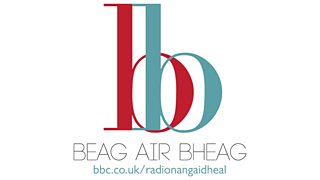Oisean a' Ghrà mair: Sreath 8: 3
1. DHÈANADH & DHÈANAINN ‘would do’ & ‘I would do’

CRIOMAG: ‘Feasgar’
Cathy NicDhòmhnaill:
“Dè am piseach a bheireadh tusa air an t-saoghal?
‘How would you improve the world?” (‘What’s the improvement that you would bring to the world’)
Eilidh Cormack:
“Bheirinn air a h-uile duine a bhith seinn, co-dhiù uair san latha!”
“I would make everyone sing at least once a day.”
-ADH ‘would’
Bheireadh tu - ‘you would bring’
Dè bheireadh tu leat? ‘What would you bring with you?’
Dhèanadh tu - ‘you would do’
Dè dhèanadh i? ‘What would she do?’
Chanadh tu - ‘you would say’
Dè chanadh iad? ‘What would they say?’
-INN = -ADH + MI ‘I would’
Chanainn - ‘I would say’.
Cha chanainn sìon. ‘I wouldn’t say a thing.’
Dhèanainn - ‘I would do /would make’.
Dhèanainn sin dhut nam b’ urrainn dhomh.
‘I would do that for you if I could.’
Bheirinn - ‘I would bring/give’
Bheirinn leam mo sporan.
‘I’d bring my purse/wallet.’
Bheirinn dhut £50 - ‘I’d give you £50.’
Bheirinn ort: ‘I’d make you (do something)’,
Bheirinn oirbh a bhith seinn - ‘I’d make you all sing.’
Cheannaich iad taigh ùr.
‘They bought a new house.’
Cheannaicheadh iad taigh ùr.
‘They would buy a new house.’
Cheannaichinn taigh ùr.
‘I’d buy a new house.’
Dh’ionnsaich e dannsa salsa.
‘He learnt salsa dancing.’
Dh’ionnsaicheadh e dannsa salsa.
‘He would learn salsa dancing.’
Dh’ionnsaichinn dannsa salsa.
‘I’d learn salsa dancing.’
Shiubhail sinn air feadh an t-saoghail.
‘We travelled all round the world.’
Shiubhaileadh sinn air feadh an t-saoghail.
‘We would travel all round the world.’
Shiubhailinn air feadh an t-saoghail.
‘I would travel all round the world.’
2. BIDH mi a’ dèanamh - ‘I (regularly) do’
CRIOMAG: Feasgar
Eilidh Cormack:
“Ma tha uallach orm mu rud sam bith, ma tha mi draghail mu chàil sam bith, bidh mi dìreach a’ gabhail còig mionaidean airson òran a lorg air a bheil mi measail agus [bidh mi] dìreach a’ seinn.”
“If I’m worried about anything, if I’m bothered about anything at all, I just take five minutes to find a song I like, and I just sing.”
Cathy NicDhòmhnaill:
“Bidh an fheadhainn tha còmh’ rium, an fheadhainn nas òige, ag ràdh ‘Sguir dheth!’ oir bidh iad a’ smaoineachadh gur e rud sgriosail a th’ ann, ’s bidh mise a’ smaoineachadh, ‘Chan eil duine ga mo chluinntinn – chan eil mi sgal àrd, aig àrd mo chlaiginn!’”
“The people who are with me, the younger ones, they say ‘Stop it!’, because they think it’s awful (‘it’s an awful thing’), and I think ‘Nobody can hear me – I’m not screeching at the top of my voice (‘top of my skull’)!’”
Bidh mi a’ gabhail còig mionaidean.
‘I will be taking five minutes.’ (future) OR ‘I take five minutes.’ (regular action)
Bidh mi a’ seinn.
‘I will be singing’ (future) OR ‘I sing’ (regular action)
Bidh iad ag ràdh...
‘They will be saying…’ (future) OR ‘They say’ (regular action)
Bidh mise a’ smaoineachadh.
‘I will be thinking’ (future) OR ‘I think’ (regular action)
3. ÀS A DHÈIDH ‘after it, afterwards’
“Agus tha mi a’ faireachdainn nas fheàrr às a dhèidh.”
“And I feel better after it/afterwards.”
Às dèidh rudeigin - ‘after something’
Às dèidh sin - ‘after that’
‘After me - after you - after him (/it) - after her’:
às mo dhèidh - às do dhèidh - às a dhèidh - às a dèidh
Bha mi a’ coimhead às a dèidh.
‘I was looking after her.’
Bidh mi a’ coimhead às a dhèidh.
‘I look after him.’
Tha mi a’ faireachdainn nas fheàrr às a dhèidh.
‘I feel better after it.’
After us - after you(s) - after them’:
Às ar dèidh - às ur dèidh - às an dèidh
Ruith mi às an dèidh.
‘I ran after them.’

